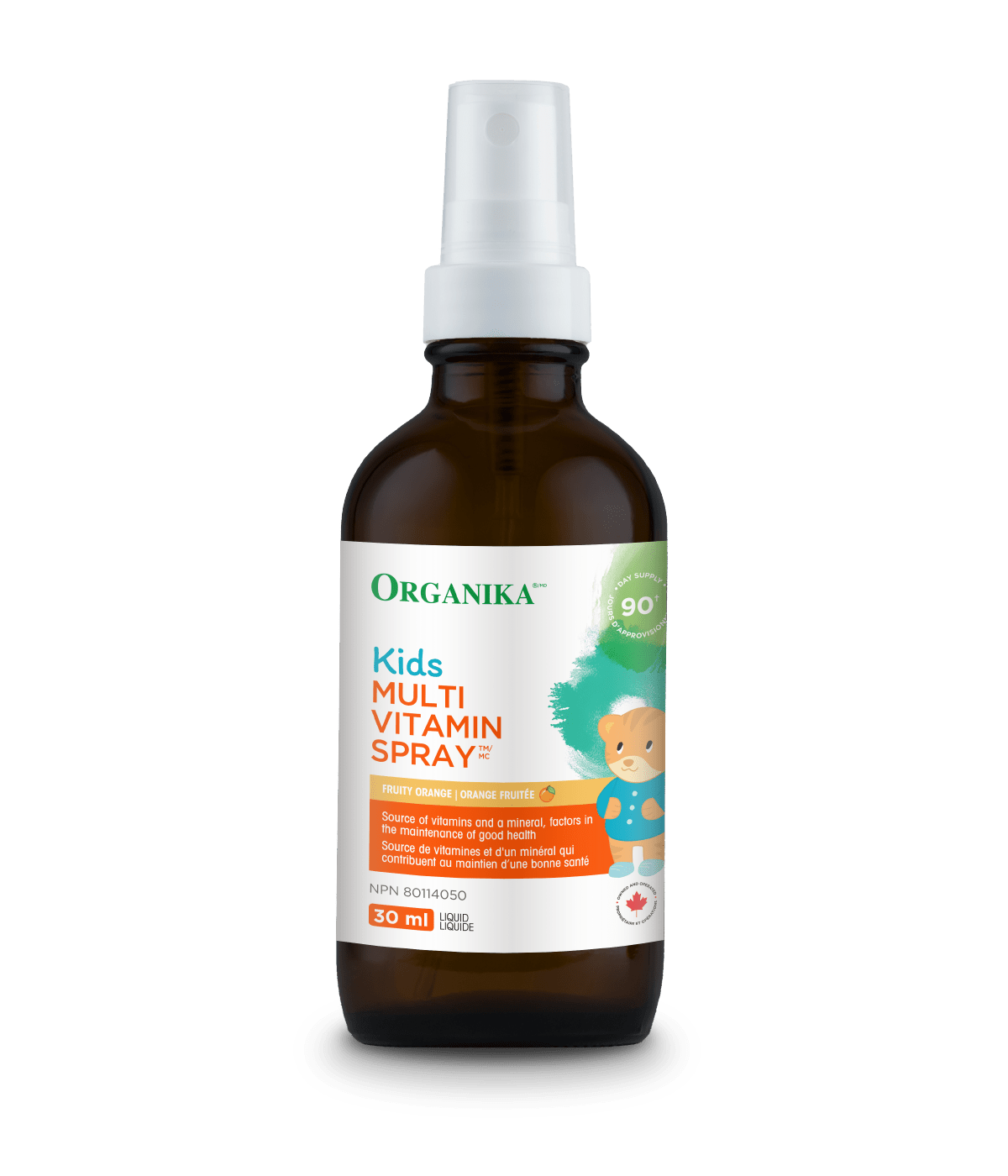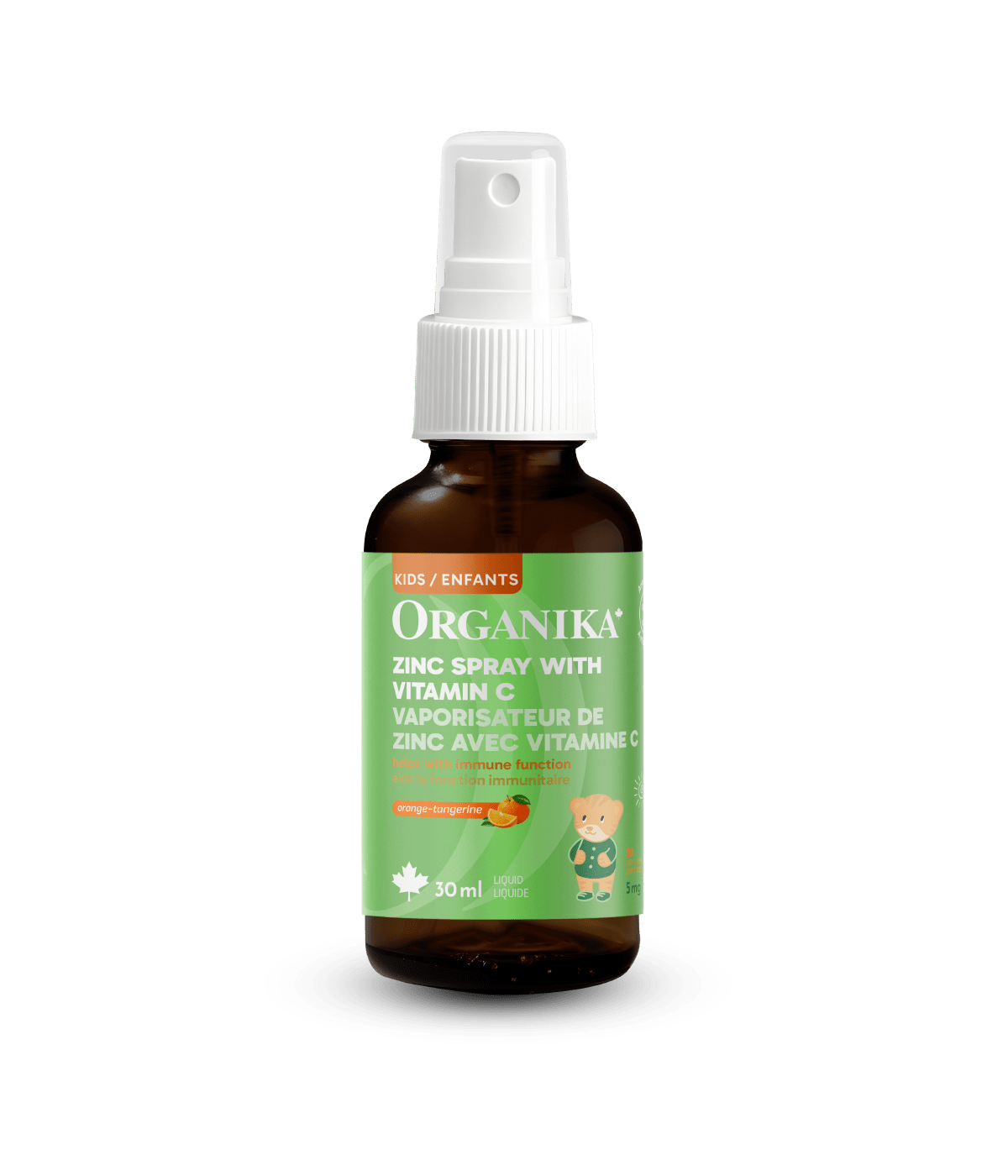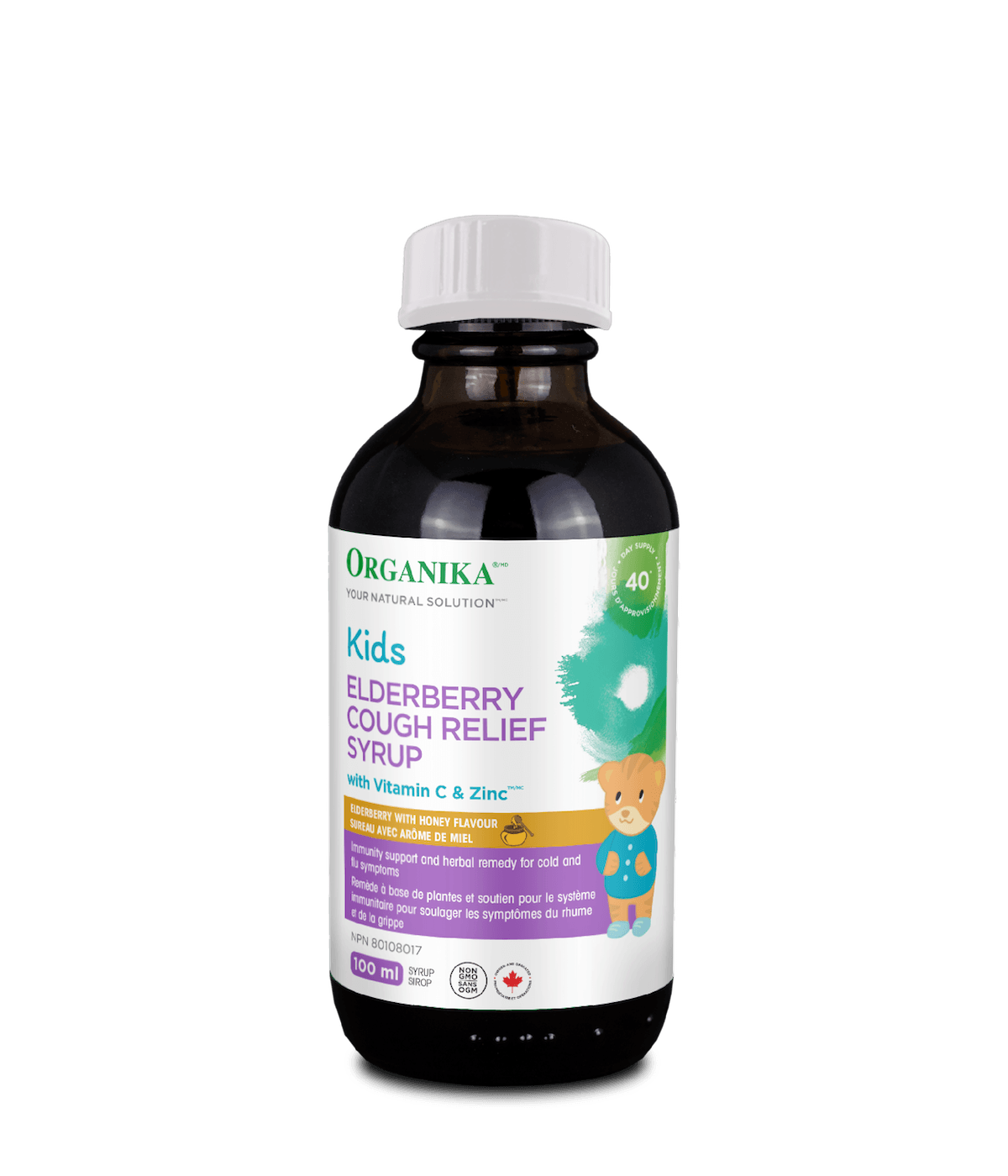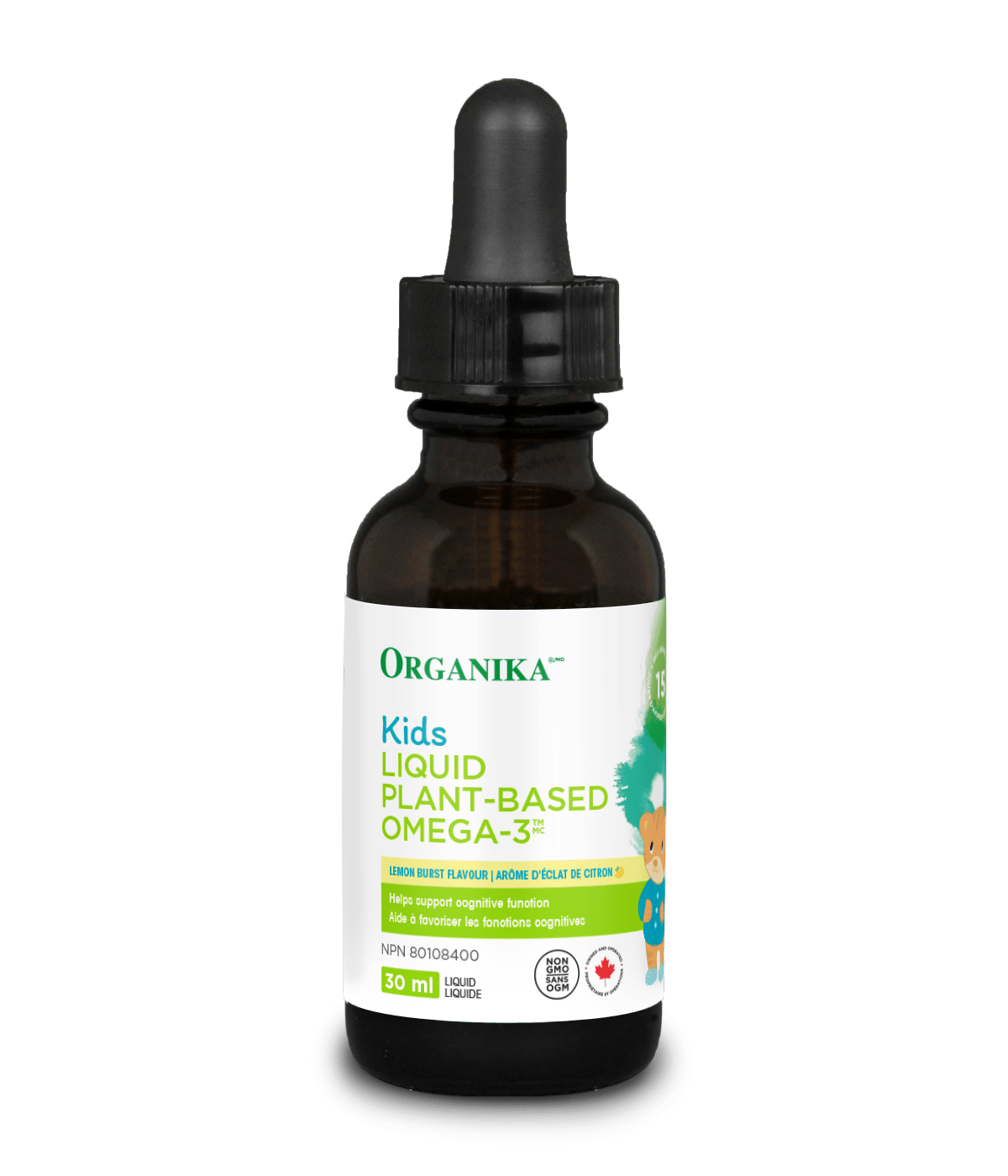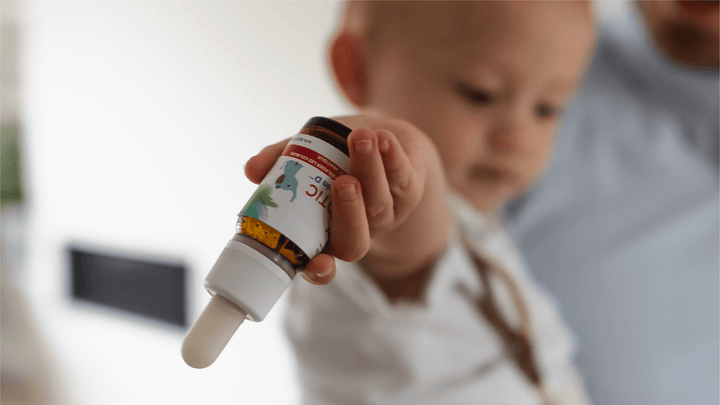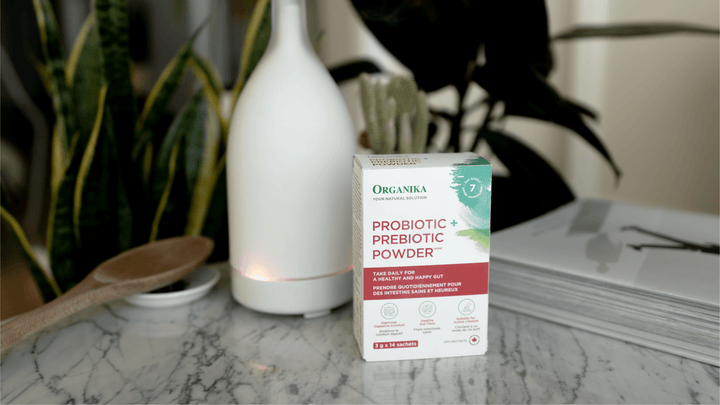
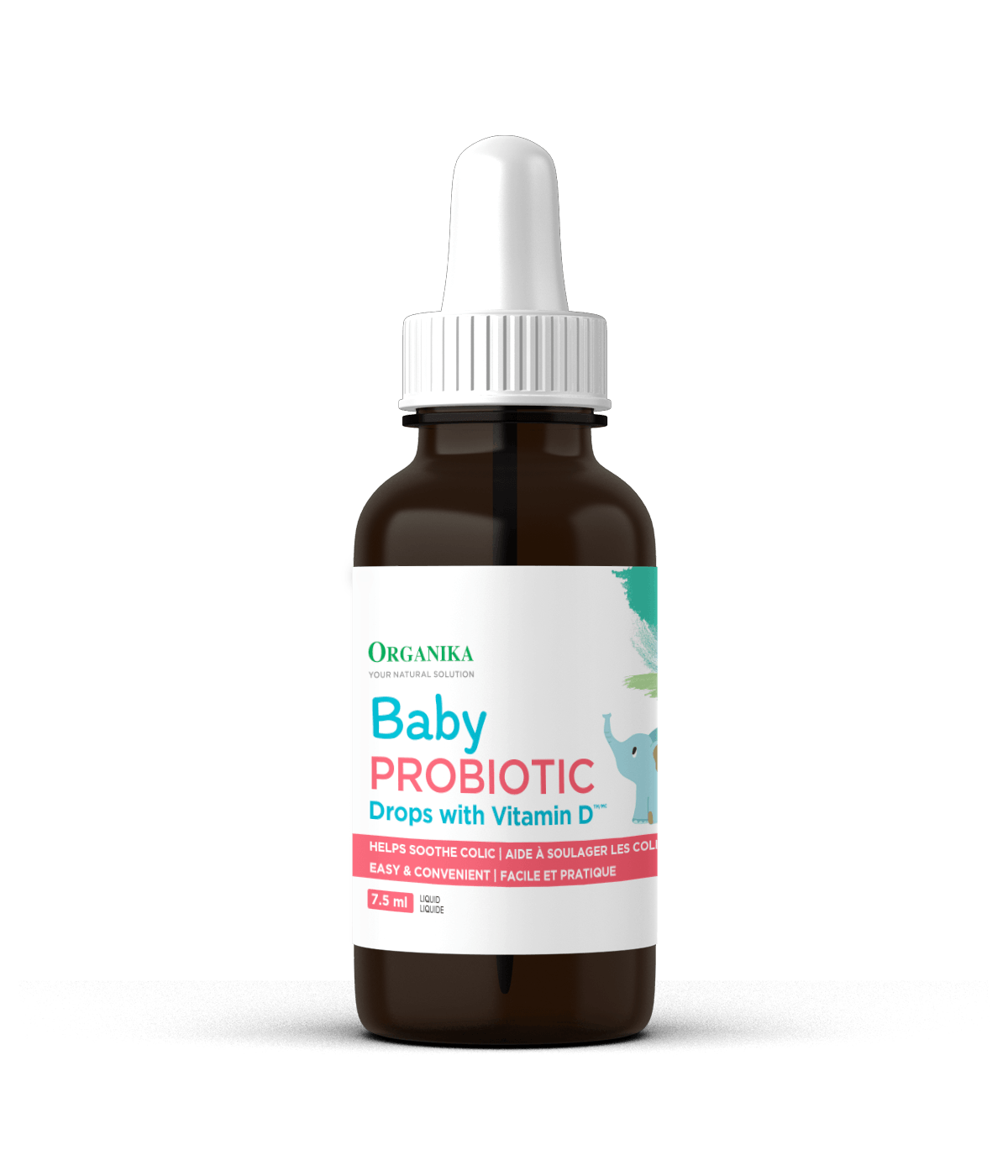
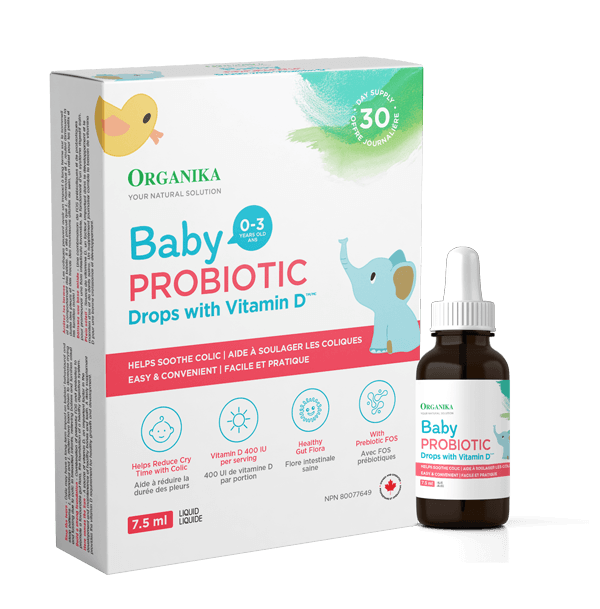




-
Is this right for you?

-


-


-

Des gouttes de probiotiques pour bébés avec de la vitamine D
A daily drop to support babies digestive and immune health
- Helps reduce crying and fussiness in breast-fed infants due to colic
- Provides vitamin D for building and maintaining strong bones and teeth
- Probiotics support digestive health
- Supports healthy immune function Easy-to-use liquid drops for babies
Couldn't load pickup availability
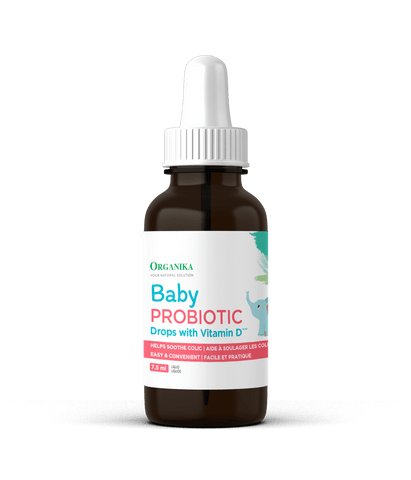
Notify Me When Available
Enter your email and we'll let you know as soon as this product is back
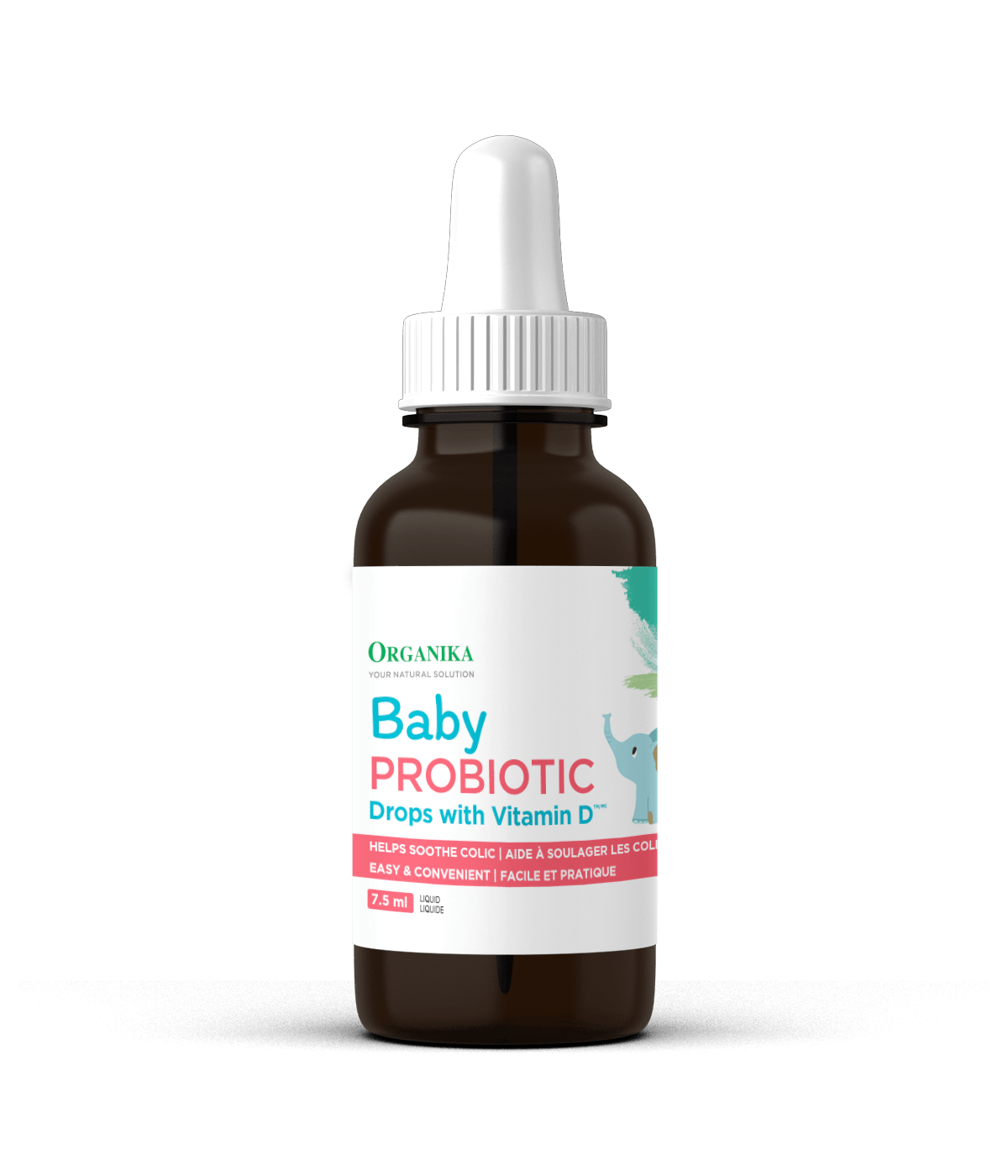
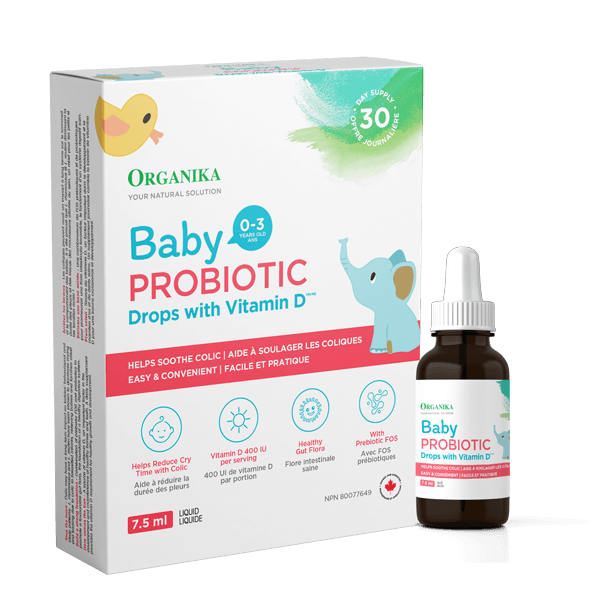


Supplement Facts
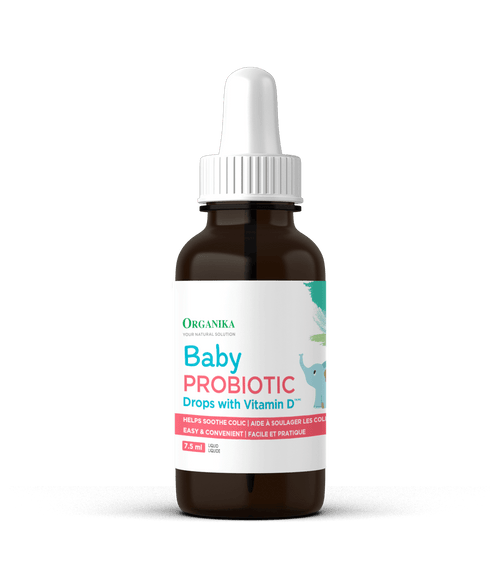
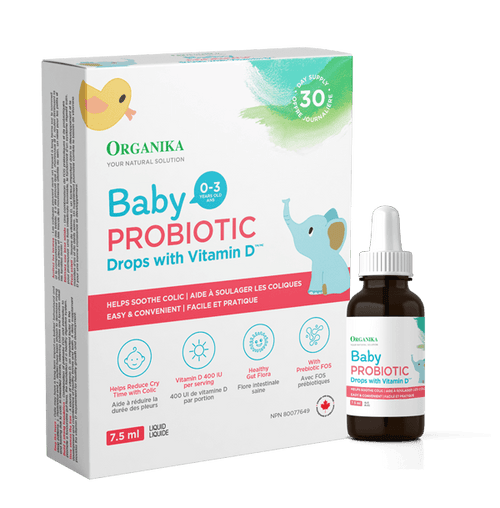
Ingredients & Nutrition
MEDICINAL INGREDIENTS (PER DROP / DOSE UNIT): Lactobacillus rhamnosus (19070-2) 25 Million CFU*, Lactobacillus reuteri (12246) 25 Million CFU*, Vitamin D3 (Cholecalciferol) 2 ?g (80 IU), *Colony Forming Unit
NON-MEDICINAL INGREDIENTS: Sunflower Seed Oil, Fructooligosaccharides
How to Use: Mix 5 drops with breast milk or infant formula, or dispense directly from dropper into babyís mouth, 1 time per day. Cautions: Do not exceed 5 drops in 24 hours. Do not add to hot drink or food.
Is This Right for You?
Is your breast-fed infant showing signs of colic?
Are you looking to support your baby's digestion naturally?
Do you want to ensure your baby is getting enough vitamin D?
If you answered ''yes'' to any of the above, this product is right for you.

-
Supports healthy immune function
-
Easy-to-use liquid drops for babies
Ingredients & Nutrition
Recommend For
Is your breast-fed infant showing signs of colic?
Are you looking to support your baby's digestion naturally?
Do you want to ensure your baby is getting enough vitamin D?
If you answered ''yes'' to any of the above, this product is right for you.

Sans gluten
Non-OGM
Dairy-Free
A daily drop that helps little tummies feel better while easing signs of colic, maintaining immune function and supporting digestive health


The Full Scoop

-
Supports healthy immune function
-
Easy-to-use liquid drops for babies
If you've ever asked yourself why your baby is crying so much (and probably in the wee hours of the night), you're not alone. Colic is one of those mysterious baby phases, often defined by long periods of crying in otherwise healthy infants, usually in the first few months of life. The cause? Still a bit of a puzzle, but research points to digestion playing a big role. When digestion is supported and immunity is strong, babies just feel better.
We wanted to make a simple, no-fuss formula that combines active probiotic strains with vitamin D to help support your baby's gut health and immune system. That's where our Baby Probiotic Drops with Vitamin D come in.
They're easy to use and gentle on tiny tummies, helping to reduce crying and fussiness in breast-fed infants with colic. At the same time, the addition of vitamin D supports normal growth and helps develop strong bones and teeth.
Recommended age: 0-3 years
Ask Away
We’ve got the FAQs covered. But if you’re still stuck, we’re only a message away.
Get in TouchDoes this product need to be refrigerated?
No! Organikaís Baby Probiotic drops can be stored at room temperature. Just make sure to keep it under 25°C! This makes it a great product to be taken on-the-go or when travelling.
Does it matter what strains are in a probiotic?
There are many different strains of probiotics, but research has shown that they don't all have the same effects. When purchasing probiotics, it is important to make sure it contains clinically-studied strains with proven benefits. Organika's Baby Probiotic Drops' probiotic strains are clinically studied and science-backed.
Isn't more bacteria better?
Different probiotics are effective at different levels. More does not necessarily mean better! The effective dose for any given probiotic depends on the strain used and is determined based on clinical studies. The strains used in Organika's Baby Probiotic Drops have been clinically proven to work at the quantities used in our formula.
Are probiotics safe for infants?
There is plenty of research showing that probiotics and prebiotics are not only safe but beneficial when used by infants and young children. Like all of our products, Baby Probiotic adheres to strict quality standards and has been clinically tested to ensure its safety and efficacy.
Is this product free from common allergens?
Yes, Baby Probiotic is allergen-free and contains no eggs, preservatives, artificial flavours and colours, yeast, artificial sweeteners, wheat, soy, gluten, or GMO ingredients.
You'll Likely Also Love...
Kids Multi Vitamin Spray
One easy spray, so many complex systems covered
Kids Zinc Spray with Vitamin C
Sweet and simple immune support for kids in a fuss-free spray
Sirop antitussif au sureau pour enfants
For sore throats and mucus buid-up, turn to naturally healing elderberry
Kids Liquid Plant-Based Omega-3
Omega-3s for cognitive health development during early growth years
Support Beyond Products
Votre bébé a besoin de bactéries. Je sais, ça a l'air dégueulasse et ça va à l'encontre de notre instinct selon lequel bactéries = mauvais. Mais ces petits gars sont peut-être exactement ce dont votre petit gars (ou petite fille) a besoin pour s'installer et avoir un système digestif sain et heureux et un système immunitaire fort dans les années à venir. Et ils pourraient bien vous éviter des heures de frustration et de sommeil manqué. Parlons des bébés probiotiques, bébé ! Que font les bébés probiotiques ? À l'âge adulte, nous avons des billions de bonnes bactéries qui vivent dans notre intestin et qui nous aident à maintenir un système digestif sain. C'est ce qu'on appelle le microbiome de l'intestin ! Tout comme les empreintes digitales, cette collection de bactéries est unique à chaque personne. Parmi les fonctions du corps qu'elles aident à remplir, citons La digestion de certains aliments que votre estomac et votre intestin grêle ne peuvent pas digérer ; Produire des vitamines (telles que B et K) ; aider à contrôler les mauvaises bactéries. (Plus d'informations à ce sujet plus tard !) Mais cela ne commence pas comme ça. Quand les bébés sont dans l'utérus, leur ventre est une ardoise vierge. Une fois qu'ils sont sortis de l'utérus, ils commencent à rassembler une petite armée d'assistants intestinaux, les bactéries qu'ils rencontrent lorsqu'ils interagissent avec le monde qui les entoure. Les probiotiques aident à introduire de "bonnes" bactéries pendant les trois premières années de vie, ouvrant la voie à un microbiome intestinal sain et équilibré plus tard dans la vie ! Les probiotiques pour bébés renforcent-ils l'immunité ? Le système immunitaire est notre première ligne de défense contre les insectes extérieurs, et même si nous n'y pensons pas souvent de cette façon, l'intestin fait partie de cette équipe de défense. Un intestin sain est particulièrement important chez les bébés et les jeunes enfants, dont l'immunité est encore en développement ! La supplémentation en probiotiques pour bébés pourrait même aider à réduire l'utilisation des antibiotiques : des recherches ont montré que les probiotiques peuvent aider à réduire l'incidence et la durée des infections respiratoires, digestives et auriculaires chez les enfants. Puis-je utiliser des probiotiques pour bébés en cas de coliques ? La cause exacte des coliques infantiles fait l'objet d'un débat au sein de la communauté médicale, mais les probiotiques pourraient être une lumière au bout du tunnel pour les parents frustrés ! Des études ont établi un lien entre certaines souches de probiotiques et la réduction de la durée des pleurs chez les bébés allaités présentant des symptômes de coliques, ainsi que la diminution des appels téléphoniques et des visites chez le médecin liés aux coliques. Comment les bébés probiotiques fonctionnent-ils ? L'intestin est comme un minuscule écosystème. Lorsque les bactéries commencent à s'y installer, elles se font concurrence pour la nourriture et l'espace. En gros, l'ajout de bonnes bactéries dans l'intestin de votre bébé avec des probiotiques garantit que les ressources disponibles dans l'intestin sont utilisées par les gentils avant même que les méchants n'y arrivent ! Les nouvelles gouttes probiotiques pour bébé d'Organika avec vitamine D contiennent un mélange cliniquement prouvé de souches probiotiques et de la vitamine soleil pour un microbiome intestinal équilibré, des os et des dents sains et moins de larmes ! Vous voulez aussi contrôler votre propre intestin ? Essayez la poudre probiotique + prébiotique. Références : Gut microbiota info (Microbiote intestinal pour la santé) https://www.gutmicrobiotaforhealth.com/en/about-gut-microbiota-info/ Probiotiques et santé immunitaire (Yan, F. & Polk, D.B. in Avis actuel en gastroentérologie ) https://www.ncbi.nlm.nih.gov/pmc/articles/PMC4006993/ Les probiotiques pourraient réduire le besoin d'antibiotiques pendant l'enfance (Cristina Saez dans Gut Microbiota for Health) https://www.gutmicrobiotaforhealth.com/en/probiotics-could-reduce-the-need-for-antibiotics-during-childhood/ Lactobacillus reuteri (American Type Culture Collection Strain 55730) versus simethicone dans le traitement des coliques infantiles : une étude prospective randomisée (Savino et al. in Pediatrics, 2007) https://www.ncbi.nlm.nih.gov/pubmed/17200238 Effets préventifs des probiotiques oraux sur les coliques infantiles : un essai prospectif, randomisé, en aveugle et contrôlé utilisant Lactobacillus reuteri DSM 17938 (Savino et al. in Beneficial Microbes, 2015) https://www.ncbi.nlm.nih.gov/pubmed/25488262
read moreVous avez littéralement des billions de bactéries qui vivent dans votre intestin, mais vous savez quoi ? En ce qui concerne le microbiome intestinal, plus c'est plus. Les bactéries sont essentielles à la santé de votre intestin, point final. Elles aident à décomposer et à digérer les aliments, à maintenir la santé générale de l'intestin et à soutenir le système immunitaire. Plus il y a de bonnes bactéries dans votre intestin, moins il y a de place pour les bactéries nocives qui peuvent causer des désagréments. Que sont les probiotiques et pourquoi sont-ils importants ? C'est là qu'interviennent les probiotiques : ce sont des aliments ou des compléments qui contiennent les types de bactéries que vous souhaitez avoir dans votre équipe ! Certains des plus courants s'appellent Lactobacillus et Bifidobacterium, mais il existe de nombreuses espèces et souches de probiotiques, dont les effets sur la santé humaine sont différents. Parmi les avantages les plus étudiés de la prise de probiotiques, on peut citer Améliorer les symptômes des troubles intestinaux légers Soulager les gaz et les ballonnements Promouvoir l'équilibre du microbiome intestinal Favoriser la croissance des bactéries bénéfiques après l'utilisation d'antibiotiques Que sont les prébiotiques et que font-ils ? Oui, vous avez bien lu : il y a aussi les prébiotiques. Et quelle différence une seule lettre peut faire ! Les prébiotiques sont des types de fibres que notre corps n'est pas capable de digérer. Ils servent plutôt de carburant aux bactéries probiotiques. Ils présentent des avantages pour la santé, comme l'équilibre du taux de sucre dans le sang et l'absorption de minéraux qui renforcent les os. La racine de chicorée, l'ail, les légumes verts à feuilles, les légumineuses et les bananes sont tous d'excellentes sources alimentaires de prébiotiques. Probiotiques + prébiotiques = ? Avez-vous déjà fait le calcul mental ? Si oui, vous avez peut-être remarqué que c'est une bonne idée de prendre les probiotiques et les prébiotiques ensemble ! Les suppléments qui combinent les deux sont connus sous le nom de synbiotiques. Combinés, les probiotiques et les prébiotiques favorisent la croissance et la survie des bactéries probiotiques que vous absorbez. Cela maximise les avantages pour la santé que vous obtiendriez en prenant des probiotiques ou des prébiotiques seuls. Outre les bienfaits pour la santé intestinale que procurent les probiotiques dont nous avons parlé plus haut, la prise d'un complément synbiotique peut être utile : Immunité : un microbiome intestinal équilibré est un élément important pour assurer le bon fonctionnement de votre immunité, en contribuant à conditionner le système immunitaire à différents types de bactéries. Les synbiotiques semblent également contribuer à réduire l'inflammation intestinale et générale, selon quelques études sur les animaux. Santé cardiaque : Les synbiotiques peuvent avoir un effet sur la façon dont notre corps métabolise les graisses, avec des avantages potentiels dans le contrôle des niveaux de cholestérol. Veiller à inclure des aliments probiotiques et prébiotiques dans votre alimentation est un excellent moyen de garder le microbiome intestinal heureux et équilibré. Si vous avez besoin d'un coup de pouce (ou de millions de petits coups de pouce !), envisagez un complément synbiotique, comme la poudre Probiotique + Prébiotique d'Organika, pour un coup de pouce quotidien facile à la santé de vos intestins ! Pour un probiotique qui peut vous aider à lutter contre les infections causées par des bactéries, consultez notre nouveau Probiotique + Cranberry !
read moreBy now we have all heard about “probiotics” or “probiotic rich" foods as our digestive tract and its health is becoming a big topic in our overall health. Probiotics are becoming more and more critical as research continuously shows how beneficial these healthy bacteria strains are to our health. WHAT ARE PROBIOTICS? So what exactly are probiotics and why do they get so much hype? Well for starters, let us get right into the name! The word “Pro" is a Greek word for promoting and “biotic” is the meaning for life. Probiotics, when you research it or read about them online, are known as live organisms that are essential for promoting a healthy balance of “ good “ bacteria in our digestive tract. They are what is known as “ healthy”, “good”, “friendly “ bacterial strains that are known to increase optimal digestive health and increase and support our immunity. Excellent or healthy bacteria have an essential role in our digestive tracts – they are our bodies defence against the viruses and harmful bacteria that we encounter. WHAT DOES OUR DIGESTIVE TRACT DO? Our digestive tract houses thousands of microbiota (our microbiome) responsible for the functioning of our digestive health. It is essential for us to have a balance of both good and bad bacteria in our digestive tract otherwise symptoms of dysbiosis can occur ( think IBD, Crohns, Colitis, Celiacs disease ). So how do we get imbalances of healthy bacteria in our digestive tract and why do we need to supplement? Multiple factors play a role in our digestive health and bacteria. When we have dysbiosis as mentioned above, our intestinal flora can be off track. A few contributing factors to dysbiosis can be the following: Antibiotic Use ( they kill both the good and bad bacteria ) A diet high in sugar Candida / SIBO Not enough Prebiotic-rich foods ( essential for building up healthy bacteria in our digestive tract ) Stress High amounts of Caffeine Alcohol Over time our digestive tract health and generally our immunity starts to undergo changes, and we can feel start to feel sick or experience symptoms of a sluggish digestive tract. Often symptoms of dysbiosis can be : Bloating Constipation Flatulence Food sensitivities Intestinal regulation Motility Skin conditions (eczema, psoriasis, acne ) Quite often we can live with these conditions mentioned above without realizing that our digestive tract is low in beneficial bacteria known to help fight off the harmful bacteria’s. That is where the world of probiotics come in. HOW DO YOU CHOOSE PROBIOTIC SUPPLEMENTS? Now, this is a vast subject, to understand the dynamics of our digestive tract and how the many different strains of bacteria’s out there play a role (There are over 400 different types of strains). When you go to purchase probiotics, it can be overwhelming. I often get asked, "How do you choose?" and "Which brand do you choose?" That is an excellent question! I usually suggest to my clients to look for a probiotic with more than 3 different strains! Each strain of bacteria that you find in probiotics is beneficial to various health benefits! The most common strains that you see in probiotics are: Bifidobacterium animalis. Lactobacillus Lactobacillus acidophilus. Another essential factor to consider when you are purchasing probiotics is to ensure that they are stomach acid stable ( meaning that they are enteric coated and will withstand your stomach acid after ingestion). You also want to consider the CFU amount ( Colony forming units ) – this is how much of the particular strain is in this specific probiotic. The higher the CFU, the higher the amount of strain. I like to suggest anything higher than 15, 000 CFU’s and up to 75,000 a day. A lot I know, however depending on your digestive tract, this can be a game changer to some of your symptoms. PROBIOTIC FOODS TO CONSUME: Another critical factor to point out as well when discussing probiotics are “ probiotic-rich foods”. I hear lots of my clients tell me how they eat lots of probiotic-rich foods; therefore they don’t need to supplement with a probiotic. Probiotic-rich foods are foods that have gone through a fermentation process ( kombucha, yoghurt, sauerkraut, kimchi). Although they are probiotic-rich foods – they aren’t probiotic strains. They are essential in building up the good, healthy bacteria flora in our digestive tract ( similar to the role of prebiotics). They, however, do not add in essential bacterias like a probiotic supplement does. I generally suggest doing both for increased digestive health and a good healthy digestive tract flora. CONCLUSION: When we think of Probiotics – I like to acknowledge the power of them and their overall health benefits. I want to nickname them “ natures anti-biotics” as they play the same role in our body as anti-biotics do without destroying the balance of good and bad bacteria. Probiotics help increase the stability of intestinal flora, help strengthen our immunity, assist with nutrient absorption, prevent diseases, toxins and harmful parasites from affecting our health as well as play a beneficial role in our skin health. Paired with foods rich in prebiotics ( foods rich in inulin – asparagus, garlic, onions, leeks, dandelion root), probiotics can flourish in our digestive tract with supplementation and a healthy lifestyle. Often within two weeks of supplementing with probiotics people will notice a significant reduction in their gastrointestinal symptoms, a change in their skin health as well as their overall daily health. I generally like to recommend to my clients to supplement with probiotics daily. Over time and due to our lifestyles the imbalance in our intestinal flora can change, and we don’t have the same amount of beneficial flora as we did as babies. I like to recommend taking a probiotic daily and at bedtime. Organika carries two different types of probiotics that are both enteric coated and have the essential strains for healthy intestinal flora. -RECOMMENDED PRODUCTS- Active Acidophilus Super Active Multi-Dophilus Probiotic that forms part of a natural, healthy gut flora. A comprehensive blend of probiotics that promote healthy microbial balance and supports the function of the digestive tract. – Chelan Wilkins, RHN – National Education Trainer
read more





